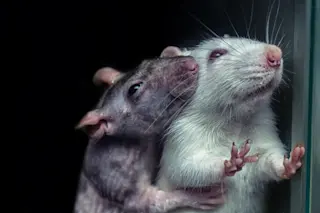(Credit: Preobrajenskiy/Shutterstock) What hurts one mouse, hurts every mouse. That's the conclusion of a new study examining the social transfer of pain in mice. When one group of mice was exposed to a painful stimulus, a completely unaffected group displayed the same kind of heightened sensitivity as the first. Given that mice are mammals like us, the effect could also exist in humans, as well as informing future pain research.
In their study, researchers from the Oregon Health and Science University worked with two groups of mice: one group that was subjected to a few different kinds of pain stimuli, and one that was left alone. Injecting inflammation-causing toxins or inducing morphine and alcohol withdrawal were among the ways researchers stimulated a pain response. The two groups of mice were kept together, and the researcher periodically assessed their responsiveness to pain by poking them or dipping their tails in hot ...














